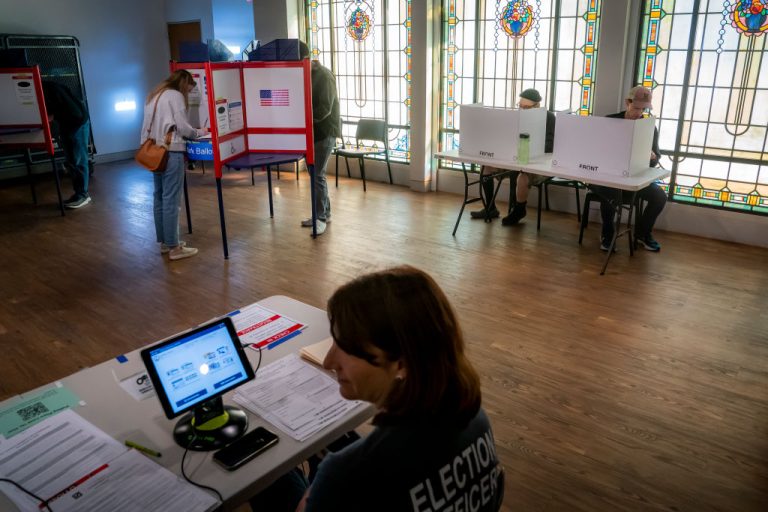The State of Virginia’s Department of Elections announced it will be removing almost 19,000 deceased people from the voting registry, with some potentially dating as far back as 1960.
Announced on April 21 by the Department, the agency stated it had “examined its data sharing relationship with the Virginia Department of Health [VDH]” and in the process “requested a review of all VDH death records going back to 1960.
“VDH discovered death records that had not been previously shared with” the Department of Elections.
The Department stated that its own staff ran “additional data analysis” on the set and subsequently, “18,990 records of registered voters were identified” and are set to be removed “in the coming weeks.”
“As a result of these findings and process improvements, citizens can expect to see a significant number of names removed from Virginia’s voter rolls,” the announcement stated.
Success
You are now signed up for our newsletter
Success
Check your email to complete sign up
The changes come under the reign of Governor Glenn Youngkin, a Republican, who won by a narrow margin of under 65,000 votes out of more than 3.2 million cast in 2021, a notable decision in a state that had only elected one other GOP member as Governor since 2005.
Election reform was a bullet item on Youngkin’s campaign, telling Fox News in February of 2021, “This is not a Democrat issue or a Republican issue, it’s a democracy issue … Both parties have long raised concerns, and we must restore Americans’ faith in the integrity of our elections” while announcing an election integrity “task force.”
Fox stated that Youngkin promised a “politically independent and transparent Virginia Department of Elections” that would update “voter rolls monthly to provide accurate voter information.”
The issue of dead voters on the registry appears to have been known for some time. In April 2020, when the presidential election was just months away, a legal interest group filed a court briefing alleging that Virginia’s voter rolls held 11,600 deceased people in addition to 1,772 voters claiming a commercial address as their primary address and 600 voters with duplicate registrants, Breitbart reported at the time.
In Virginia, Joe Biden defeated Donald Trump by a margin of more than 50,000 votes out of more than 4.2 million cast.
Nonetheless, basic electoral process reforms that require the passing of legislation to manifest have met with obstacles under the Youngkin administration.
In January, the Democrat-controlled Senate Privileges and Elections Committee put the kibosh on a proposed bill to update Virginia laws to require photo identification to vote, Courthouse News Service reported.
Virginia State Delegate Cia Price, a Democrat, was quoted as arguing, “We support voter ID, but not photo ID,” in comments after passing legislation in 2022 that removed photo identification requirements.
Price was paraphrased by CNS as arguing that “her 101-year-old great aunt who had issues with her birth certificate that kept her from getting a state-issued ID, which is not uncommon among older Black Americans” was a cornerstone of the campaign, and that being able to prove residency with utility bills was the reason the centennial could vote.
March reporting by NBC Washington states that Youngkin has also reinstated a mandate in the Virginia Constitution that mandates those convicted of felonies lose their right to vote until the Governor restores them.
The outlet stated that this process “was relaxed by former Republican Gov. Bob McDonnell, and was eased further by democrats Terry McAuliffe and Ralph Northam, until the process was nearly automatic.”
According to the article, after release, felons will have to apply to the State to have their rights restored in a process that will now require a systematic review.
With the 2024 presidential election on the horizon, one potentially facing a heavyweight rematch between Donald Trump and Joe Biden, who announced he would run for a second term on April 25, election reform movements are prolific.
In February, the Brennan Center for Justice (BCJ) released its February 2023 Voting Laws Roundup, where it stated that “legislators [are] introducing a record-breaking number of restrictive voting laws.”
Thirty-two separate states had filed as many as 150 “restrictive voting bills,” the BCJ summarized.
The Center clarified, “Legislation is categorized as restrictive if it contains one or more provisions that would make it harder for eligible Americans to register, stay on the voter rolls, or vote as compared to existing state law.”
The BCJ stated that in the first few weeks of 2023, 10 states had put forth 27 different election interference bills.
“Two of the more radical proposals include a Texas bill that would allow presidential electors to disregard state election results and a Virginia bill that would empower a random selection of residents to void local election results,” the BCJ stated.
But introducing legislation and passing it are two different issues.
The BJC said, “This year’s increase in the pace of introduction will not necessarily translate into an increase in passed legislation,” noting that 2022 likewise saw more restrictive bills introduced compared to the year prior, but that “fewer bills were passed by the close of the year.”















